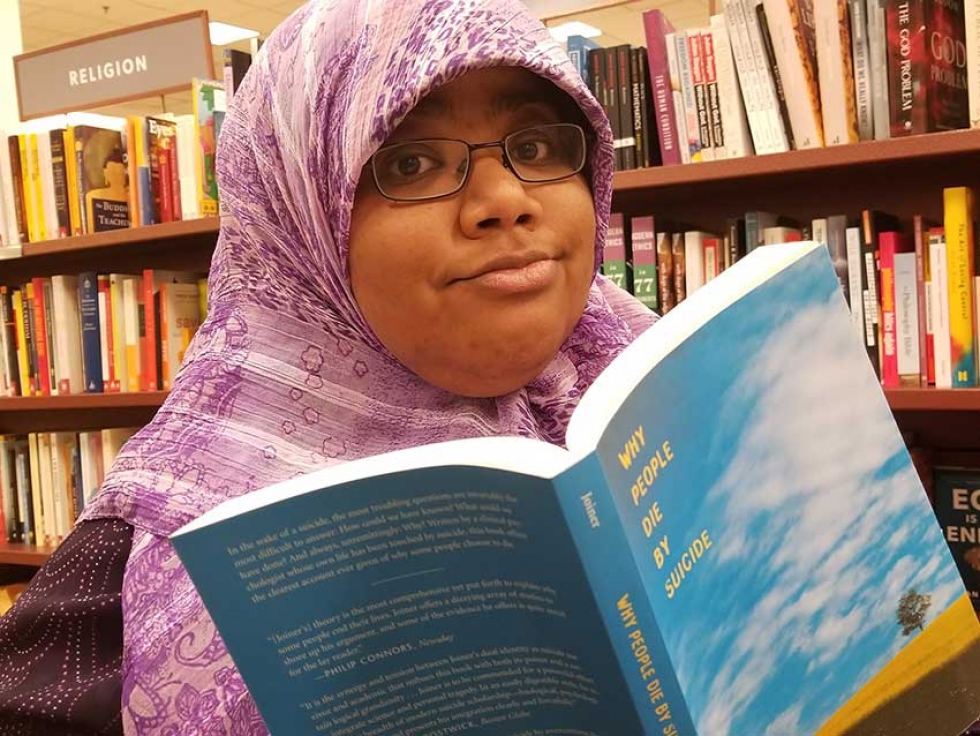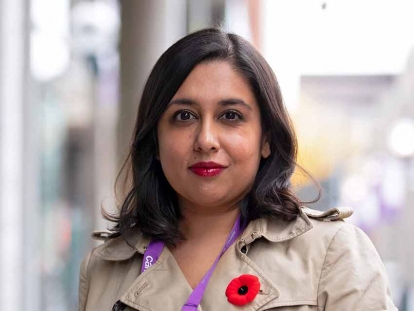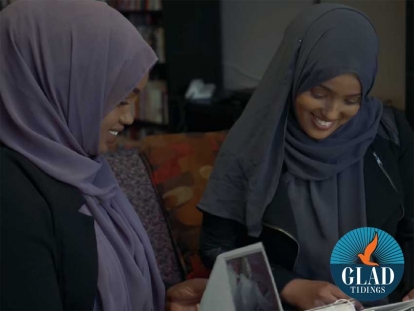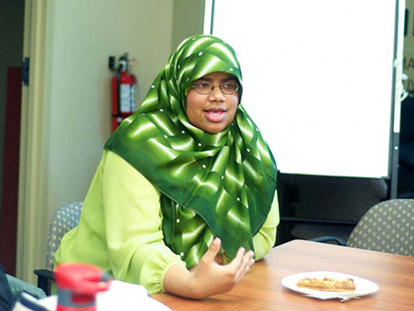
Sep
Lessons Learned After My Last Suicide Attempt for World Suicide Prevention Day
Written by Chelby DaigleMy name is Chelby Marie Daigle, I'm the Editor in Chief of MuslimLink.ca and my last suicide attempt was in July 2017.
This is not the first time I have written about my struggle with suicide on this platform, but today I am sharing my experience in the context of World Suicide Prevention Day, which is today, September 10th.
World Suicide Prevention Day (WSPD) was founded by the International Association for Suicide Prevention (IASP) and is recognized by the World Health Organization.
The theme for this year's WSPD is "Working Together to Prevent Suicide" because, according to IASP, "Preventing suicide requires the efforts of many. It takes family, friends, co-workers, community members, educators, religious leaders, healthcare professionals, political officials and governments." It also requires the voices of people like myself, who are suicide attempt survivors, and also those of us who have lost a loved one to suicide, suicide loss survivors, which I also am.
So, I am going to share the role that "working together" has played in helping me recover from my last suicide attempt and prevented me from attempting again now for a two year period after several years of multiple attempts after the suicide of my mother in 2013.
From crowdfunding through my social network in order to support myself and now help me through financial crises after I had to leave my job due to my illness, to social programs like the Ontario Disability Support Program (ODSP) which I now qualify for, to the regular efforts of friends who help with everything from cleaning, moving, grocery shopping, and helping me when I need extra help to manage work tasks, literally 100s of people have worked together, to help me still be here today.
But to better understand why this support from everyone from friends, mental health professionals, and government programs has been key in helping me recover it is important to reflect on what we know about why people die by suicide.
Why Do People Die By Suicide?
My decision to become Muslim was very much wrapped up in my need to find a way to commit to life after repeated attempts at suicide during my teens and early 20s. I needed a way to find meaning.
But it was only after my mother's death that I fully realized that I was trying to hold on to life in order to take care of her more than anything else.
Since her death, which I was unable to prevent and so see myself as responsible for, I have been reevaluating a lot about my life and my choices...but I've also tried to figure out what is known about why people die by suicide in the first place.
In the book "Why People Die By Suicide", clinical psychologist Thomas Joiner outlines the Interpersonal Theory of Suicidal Behaviour. This theory posits that a lack of a sense of belonging, basically loneliness, and the perception that one is a burden on loved ones or society in general is what leads to the desire for suicide in many people. The majority of people who attempt suicide also have a mental illness, but not everyone who attempts suicide is mentally ill, and not everyone who is mentally ill ever attempts suicide.
Mental health researchers in Ontario examined 1,565 cases of suicide, identified through the Office of the Chief Coroner of Ontario, which occurred between 2003 and 2009, where a suicide note was left. According to Psychiatrist Dr. Juveria Zaheer, "Within the notes, the authors found three primary themes that could improve the identification and treatment of those with mental illness who are at risk for suicide:
- Feelings of loss of control and powerlessness, Many people who died by suicide felt that they had no control of their mental illness and its impact on their lives. Others felt that they maintained control over their lives, but were angry at themselves for being unable to change the trajectory of their illness.
- Seeing their situation as a battle between the ‘real self’ and mental illness, Several writers framed mental illness as an opponent that must be “fought,” which seemed to use up valuable mental and emotional resources. They perceived the struggle as a “losing battle,” leading to feelings of exhaustion.
- Experiences of mental health treatment that lead to hopelessness and self-blame, In over half of the suicide notes, the writers referred to previous mental health treatment. While some expressed a sense of hopelessness, feeling that there was nothing that could be done to help them get better, others blamed themselves for not responding positively to treatment. In the context of severe depression and other mental illness, it can be difficult for patients to maintain hope that their condition will improve.
My mother felt like she was a burden to me and also to the public health care system and to Canadian taxpayers as someone who lived on the Ontario Disability Support Program (ODSP). After I had to leave my job after my suicide attempt in 2017, I was really afraid about applying to ODSP because I worried that it would exacerbate the feeling I already had of being worthless and a burden to everyone as I was basically now a burden to Canadian taxpayers.
I have to admit that I do feel this way often, and I also often have to ask for financial help from friends and my social network, this feeling of people being "better off" without me is something I cope with constantly. But I counteract that by trying to "give back" to my friends and the wider community through my work running the MuslimLink.ca website and sharing resources and supports in other ways.
An important way in which we need to work together to support those of us who are coping with suicidal thoughts or who have attempted is to find ways we can feel worthwhile and that we are contributing to society. Research has shown that working is important for our mental well-being not just because of income but because of the sense of "doing our part". Finding paid and volunteer positions best suited for the talents and limitations of those of us who are coping with mental illness needs to be a priority when addressing suicide prevention.
If we want to work together to prevent suicide, we need to find ways that people who are unable to work due to our mental illness can find financial supports that are enough to live on and cover expenses related to managing our mental illness such as medication (currently covered by ODSP) and therapy (currently NOT covered by ODSP), while also being properly supported to find paid or volunteer work that can help build self-esteem and feel like we are contributing members to our families, friends, and communities.
We need to feel like contributing members of society but we also need to feel like we belong and are not alone.
After my mother's death, I felt a crushing loneliness. I lived with my mother so there was someone I saw everyday and who asked after me. After her death, I realized just how isolated I was. I am blessed to have friends, including friends I've kept since high school, but I don't see them that much as several live in other cities and are busy with their lives and families. Alhamdulillah (Thank God), my friends have been amazing! But because of my worries about being a burden, I am also very wary about leaning on them too much.
I'm an extrovert so I need to interact with people but I have to make sure to avoid situations where I feel like a burden or just can't relate to the people I am interacting with. I would also hate to think people are spending time with me to be "nice". I only want to spend time with people who feel they benefit from spending time with me.
This is the tricky thing about developing a sense of belonging and overcoming loneliness. It isn't just about being around people. It's about feeling connected and that you are contributing to other's well-being. You want to give as much as you receive, otherwise you will just feel like a burden.
Loneliness is increasingly being recognized as a public health issue that has as much of a negative impact on our mental as well as physical health as smoking and obesity. I discuss my personal struggle with overcoming loneliness in my TEDxNepean Youth talk below:
Being able to access a therapist on a weekly basis has been very important in helping me sustain my friendships while avoiding the risk of overburdening them with the emotional and cognitive challenges I face. I am honest and open with my friends about my illness and its impact on my life but I can ensure that important boundaries are maintained in order to not over-strain these vital connections.
If we want to work together to prevent suicide, we need to recognize that loneliness is a public health issue and find ways to help individuals build and sustain meaningful and reciprocal relationships, which should also include making access to individual, couple, and family therapy more affordable and accessible.
Who Dies By Suicide?
Everyone
Although it makes sense that we focus on youth suicide prevention, the reality is that suicide attempts actually INCREASE in middle age. According to Statistics Canada, people aged 40 to 59 have the highest suicide rates. Unemployment and divorce are often triggers, which makes sense according to Joiner's theory as we often will feel like a burden if we are unemployed and we may even lose a sense of belonging and community that we had from our workplaces. Divorce can also destroy our sense of belonging and can also cause major financial hardships that could lead to feeling like a financial burden.
It is really important to recognize that people from all religious backgrounds die by suicide. As a member of the Muslim community, I have seen a myth, sometimes even spread by Muslim medical and mental health professionals, that Muslims don't die by suicide as often because the faith forbids suicide and the power of our faith protects us from suicidal thoughts. Well, those folks would find it interesting to know that the current president of the International Association for Suicide Prevention (IASP) is actually Murad Moosa Khan, Professor of Psychiatry with the Aga Khan University in Karachi, Pakistan. Professor Khan stated in an interview with the Aga Khan Development Network that ""In countries like Pakistan, social factors such as unemployment, lack of access to health, education, housing, transport, justice, and poor law and order create a lot of stress. Severe stress can lead to depression and other mental health illnesses that can lead the individual to think about committing suicide." Suicide is not just a Western problem, it just happens to be more reported on in some Western countries as there is active data collection whereas most Muslim-majority countries don't collect this data.
It is true that when a person is having suicidal thoughts and is well enough to rationally tackle them, the fact that suicide is considered a sin in Islam and the idea that we were created by Allah for a reason can be very helpful in dealing with suicidal thoughts. However, that depends on how ill we are. When we are very ill, these ideas can actually be turned against us pushing us to believe we are worthless, a burden to our families, society, the ummah (the community of Muslims), sinful people who deserve death and the punishments of hellfire. Instead what Muslims and other faith communities really need to be focusing on is what protective factors belonging to a faith community can actually provide to people beyond just theology. It's really pretty simple-COMMUNITY. The more people we have looking out for us and offering understanding and support the more likely it is that there can be some intervention that could prevent a suicide or offer proper support to suicide attempt survivors and the families of suicide loss survivors. Unfortunately though, often those of us who are suicide attempt survivors and sadly even our families who experience suicide loss, may not feel safe disclosing to our brothers and sisters in faith because of the dynamics and politics of the faith institutions we may belong to. Let's face it, some faith institutions are downright toxic, snobby, and just make us feel like trash. This needs to change. So before these institutions look to offer "counselling" or lectures on mental health, why not take a good hard look at the health of your faith institution and whether it is a welcoming place where staff and volunteers are treated with respect and that encourages a sense of belonging from anyone no matter their socio-economic status, race, family status, or family connections. A lot of faith institutions remind me of the worst of high school hierarchies, with the popular kid cliques, the mean girls, the club presidents and then the rest of us.
Individual Members of my faith community have been incredibly supportive to me personally since I have been public about being a suicide attempt survivor and a suicide loss survivor. I have also been invited to speak at certain faith institutions across Canada that appeared to me to be clearly committed on multiple levels to creating a sense of welcome and belonging for their members, but frankly they have been relatively few. I personally don't attend any particular mosque or faith based space in my city because I just haven't found them to be very safe spaces for someone like me.
However, I have found programming by Muslims which I have felt safe in and so I think it is important to look at programming that may or may not be connected to faith institutions but is somewhat independent of their politics as possible ways to create more welcoming spaces for Muslim community members. Examples I can give of this would be programming such as the Izzah Learning Center for Women in Ottawa which offers classes in Quranic studies for women and children, or SisterFit in Toronto which offers sports and fitness programming tailored to the needs of Muslim women, including those who wear hijab and niqab, and the Being ME Conference, an annual conference offered in cities across Canada which brings together women who discuss timely and often taboo issues such as divorce, mental health, and intimacy. When I have had the opportunity to participate in such programming, I have felt a lot of the healing power of belonging to a faith community where you have a connection with strangers as you are sisters in faith who genuinely want the best for one another. I think the fact that all of the programs I have listed have looser hierarchies, students are encouraged and supported to become teachers for example in order to make the programs sustainable, that is actually key to making these relatively more welcoming spaces from my perspective.
If we want to work together to prevent suicide, faith communities have an important role to play for their members but they must commit to creating more welcoming spaces that encourage a sense of belonging for a diversity of members and offer more programming that is less hierarchical and more aimed at skill-sharing and power-sharing among members.
Along with mental illness, suicide risk is higher among people who have experienced violence, including child abuse, bullying, or sexual violence.
Both my mother and I are survivors of incest and sexual violence in our teens and early adulthood. Along with the need to more openly discuss mental illness and suicide, we also need to be more open about discussing the impact that being a survivor of sexual violence has on our mental health. I worked for several years with the Ottawa Rape Crisis Centre and I have spoken openly about being a survivor of incest since my teens. Sadly, I have seen that some spaces, particularly religious spaces, are often more open to discussing mental illness than they are discussing the forms of trauma that may put people at risk of mental illness like incest and sexual violence. I think there is a perception in many faith communities that "these things just don't happen in our community". Well, you are VERY wrong. I regularly connect with survivors from my own religious community, the Muslim community, who are survivors of sexual abuse from immediate family members, religious educators, and community members and in several cases the inability to find support to address this trauma has directly lead to their suicide attempts.
If we want to work together to prevent suicide, we need to better educate ourselves about the realities of incest and sexual violence within our communities and learn how to support survivors and make the specialized therapy needed by survivors of sexual violence affordable and accessible.
What About Those Who Lose Someone to Suicide?
Unfortunately, there are not a lot of supports available for the loved ones of suicide loss survivors, which is a very complicated form of grief. I blame myself for my mother's death, and this is a common feeling for those left behind after a suicide, along with anger, confusion, and a search for answers as to why their loved one took their own life. Again, therapy is generally not covered in Canada unless you have insurance, so most people are just left stranded after a loss.
In 1999, US Senator Harry Reid, who lost his father to suicide, introduced a resolution to the United States Senate which led to the creation of International Survivors of Suicide Loss Day. Also known as Survivor Day, the day was designated by the United States Congress as a day on which those affected by suicide can join together for healing and support. It was determined that Survivor Day would always fall on the Saturday before American Thanksgiving, as the holidays are often a difficult time for suicide loss survivors. I think it would a good idea for more Canadians to mark this day and take the time to think about how to provide more resources to those of us who are suicide loss survivors.
This year, International Survivors of Suicide Loss Day will be on November 23, 2019.
If we want to work together to prevent suicide, we need to work together to provide support for the loved ones of people who die by suicide, including recognizing International Survivors of Suicide Loss Day.
Thank you for taking the time to read my thoughts about suicide based on my experience as both a suicide attempt survivor and a suicide loss survivor.
I have provided a list of resources on the subject, along with more information about my own suicide recovery journey below.
To support Chelby Daigle's recovery after her last suicide attempt, click here
To read the World Suicide Prevention Day Brochure in English, click here, in Urdu, click here, in French, click here
To learn more about the International Association for Suicide Prevention, click here.
To learn more about the Canadian Association for Suicide Prevention, click here
To learn more about Suicide Prevention Ottawa, click here
Mental Health Commission of Canada: Toolkit for people who have been impacted by a suicide attempt
TheMighty.com: 18 Things to Put in Your Suicide Prevention Kit
Ontario Coalition of Rape Crisis Centres: Find Numbers for Crisis Lines and Support Centre for Survivors of Sexual Violence
This article was produced exclusively for Muslim Link and should not be copied without prior permission from the site. For permission, please write to info@muslimlink.ca.
















